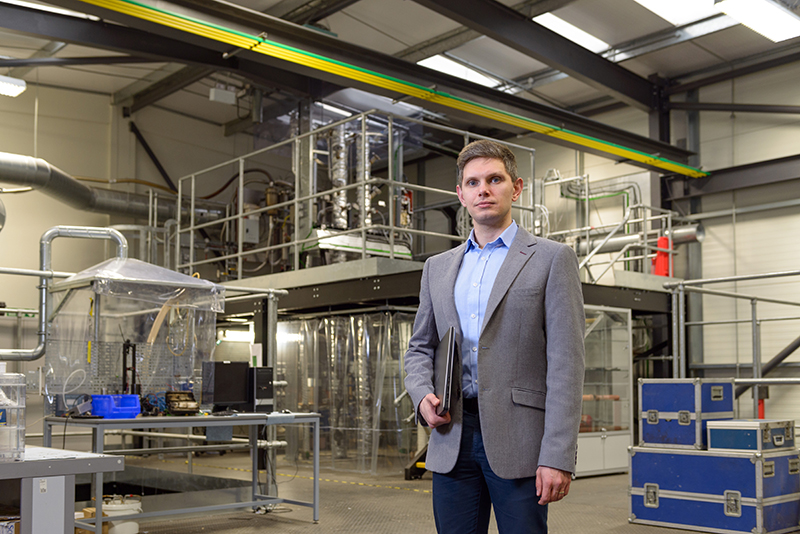What is process engineering?
17/01/2020

Process engineer – if you’ve been searching for an exciting career in engineering or STEM subjects, you must’ve come across this job title. But it isn’t always clear what the career in process engineering actually entails. As a process engineer myself, I’m often asked how does process engineering differ, for example, from chemical engineering or manufacturing engineering? Let me explain why it is exciting.
Process engineering plays a central role in our pursuit to tackle global challenges, such as climate emergency or water availability. As already stated in its name, this research area primarily focuses on any chemical, physical or biological process that aims to convert any raw materials into desired products. Therefore, process engineering has applications across energy and power, nuclear, chemical, petrochemical, water, food and drink, pharmaceutical, and many other industries.
You should remember that the process engineering is, however, a complex engineering specialisation. This multidisciplinary field is primarily based on chemical engineering, draws from environmental and mechanical engineering, and involves elements of economics and mathematics — it employes experimental techniques and systematic computer-aided tools throughout the process development cycle. The latter usually include process modelling and simulation, process economics, lifecycle assessment, and computational fluid dynamics. This implies that you don’t need a chemical engineering background to become a process engineer. Because process engineering is a cross-disciplinary field, the first degree that you need to become a successful process engineer can be in any engineering field related to energy engineering, environmental engineering, mechanical engineering, or even material science and chemistry.

Now that you know what process engineering is, let me expand on the role of a process engineer. Broadly speaking, their role is to design processes that will enable achieving a conversion of raw materials with maximised efficiency and profits, as well as minimised wastage of natural resources and environmental impact. In short, the designs need to be optimised with sustainability in mind. Sounds interesting, isn’t it?
Considering the responsibilities of process engineers, these can broadly focus on development, design, optimisation, debottlenecking, operation and control of any chemical, physical, and biological process, from carbon capture through hydrogen production to wastewater treatment and biorefinery systems. Working in multidisciplinary teams, process engineers can be responsible for a large variety of tasks. In summary, depending on the position focus and industry, the main functions can include:
- Research (design, integration, optimisation) and development of new process following the design specification;
- Design, development and installation of new equipment to improve the performance of the existing assets;
- Monitoring and evaluation of equipment and processes to ensure efficient operation of the process plant;
- Development of risk and environmental assessments to ensure the safe and environmentally-friendly design and operation of the asset;
- Management of budgets and leading teams to ensure that the projects are delivered according to the provisioned plan; and
- Analysis and presentation of data to key stakeholders, including senior colleagues and senior management.
Process engineering graduates are, therefore, among the most demanded engineers across multiple sectors, due to the flexibility of their skillset.
Now that I’ve explained what process engineering is and what process engineers do, another pertinent question is how does the job of a process engineer differ from that of a chemical engineer or manufacturing engineer. In my view, the main distinction between a process and chemical engineer is that the former do not derive new chemistry. They focus on innovation in the design of the equipment, layouts and integration of process plants to improve their efficiency, as well as reduce both environmental impact and operating cost. Such focus is also in contrast to the production or manufacturing engineers whose work focus on discrete machines, assembly lines, and manufacturing tools.
I hope that you now understand the benefits of becoming a process engineer! I trust that you have already found the opportunities to work across different industries and contribute towards solving global challenges appealing. To make it even better, the starting salary of a process engineer is between £29,000 and £32,000 and can increase to between £42,000 and £50,000 if you get over 5 years experience. This can get even higher if you become a chartered engineer! Finally, the demand for process engineers is expected to increase by 10-15% by 2026, especially among those in computer-aided process engineering. As this is faster than average for all occupations, it’s a great time to become a process engineer and solve global challenges via process engineering.
Categories & Tags:
Leave a comment on this post:
You might also like…
Keren Tuv: My Cranfield experience studying Renewable Energy
Hello, my name is Keren, I am from London, UK, and I am studying Renewable Energy MSc. My journey to discovering Cranfield University began when I first decided to return to academia to pursue ...
3D Metal Manufacturing in space: A look into the future
David Rico Sierra, Research Fellow in Additive Manufacturing, was recently involved in an exciting project to manufacture parts using 3D printers in space. Here he reflects on his time working with Airbus in Toulouse… ...
A Legacy of Courage: From India to Britain, Three Generations Find Their Home
My story begins with my grandfather, who plucked up the courage to travel aboard at the age of 22 and start a new life in the UK. I don’t think he would have thought that ...
Cranfield to JLR: mastering mechatronics for a dream career
My name is Jerin Tom, and in 2023 I graduated from Cranfield with an MSc in Automotive Mechatronics. Originally from India, I've always been fascinated by the world of automobiles. Why Cranfield and the ...
Bringing the vision of advanced air mobility closer to reality
Experts at Cranfield University led by Professor Antonios Tsourdos, Head of the Autonomous and Cyber-Physical Systems Centre, are part of the Air Mobility Ecosystem Consortium (AMEC), which aims to demonstrate the commercial and operational ...
Using grey literature in your research: A short guide
As you research and write your thesis, you might come across, or be looking for, ‘grey literature’. This is quite simply material that is either unpublished, or published but not in a commercial form. Types ...







Thank you very much for this an engaging write up. It appeares to me more clear the distinction in these field of engineering. Proudly to be your student soon.
Hi Hassan, I’m glad to see that my article has helped you! I’m looking forward to working with you soon!
Pls sir can I get in touch with you sir, I am working on a project an I need your mentorship sir.
Hi Jimson, thanks for getting in touch! Please contact me at d.p.hanak@cranfield.ac.uk.